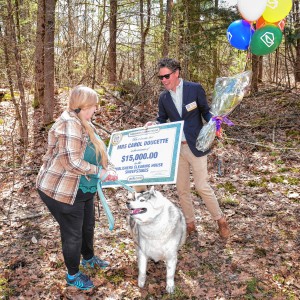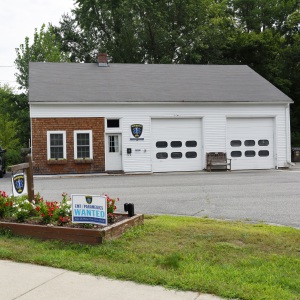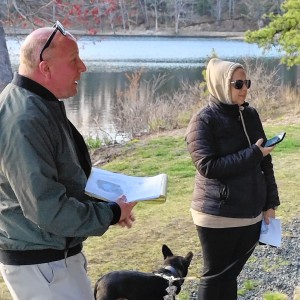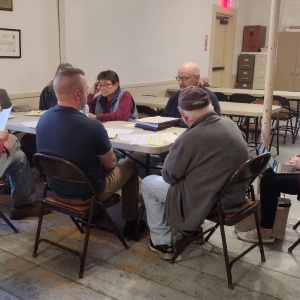Pushback: Tax fund option helps keep elders in homes
| Published: 04-17-2024 6:02 AM |
There are elderly and disabled individuals in Greenfield who are struggling to pay their property tax bills. At-large City Councilor Wahab Minhas wants to keep them out of the foreclosure pipeline, and in their homes.
When property owners fall behind in their payments, they can get caught up in an expensive and confusing collection process that ultimately leads to higher payments of interest on their arrears, legal fees, and court costs — leading to foreclosure of their home and property at public auction.
Since 1998, the state has authorized cities and towns to create an Elderly and Disabled Tax Fund “for the purpose of defraying the real estate taxes of elderly and disabled persons of low income.” To create this program, the Greenfield City Council must pass a motion to accept the provisions of Chapter 60, section 3D. Acceptance of this law authorizes Greenfield, subject to approval of the Commissioner of Revenue, to authorize voluntarily check off donations and pledges by any individual to a city “aid to the elderly and disabled taxation fund.” This law creates a Taxation Aid Committee to consist of the chairman of the Board of Assessors, the city treasurer and residents of the city to be appointed by the mayor.
The applicants for this fund must be elderly or disabled based on eligibility guidelines established locally by Greenfield. The state does not provide specific standards to define elderly or disabled. Our local committee has flexibility in administering the funds. Individuals applying for the funds must have some degree of financial hardship as defined locally, and disclose financial information in the application process. Some communities consider other factors, such as marital status, employment status, work qualifications, public assistance received by the applicant, or the value of their home.
Any amounts donated to this fund are deposited into a special city account overseen by the Treasurer, who invests said funds using the same limitations applicable to trust fund investments. The fund, with any interest earned, can only be used for the purpose specified in the law. This new fund will allow elders/disabled persons to avoid losing their homes due to back taxes. It gives donors a way to help local elders/disabled in our city. It encourages public, private, non-profit, and religious organizations to help neighbors. No additional budget appropriation is required from the city. The fund is locally run and managed by Greenfield citizens.
State law authorizes Greenfield to designate a place on its property tax bills, or motor vehicle excise tax bills, to explain how citizens may voluntarily donate and pledge an amount to the Elderly & Disabled Tax Fund. Individuals, corporations, non-profit entities, religious groups, and other funders, are all encouraged to contribute to the fund. Donors simply make a donation by check or credit card to the Elderly & Disabled Fund, and send it to the Greenfield tax collector.
I anticipate that many of our area businesses, financial institutions, health care organizations, civic organizations, and religious groups will want to step forward to become funding sponsors. Councilor Minhas attracted almost 100 “supporters” of his proposal, which was introduced to the City Council’s Ordinances Committee on April 10. I would encourage the city to develop a list of major donors whose names would appear as sponsors on the city tax bill mailers, as a gesture of good will for those donors.
This fund is another effort to prevent any elder or disabled person from losing their home to back taxes. I have written several times over the past two years about the need to end “home equity theft” in Massachusetts. This voluntary donation plan is another way to address the problem of unaffordability of taxes early on before the legal conveyor belt towards foreclosure speeds up.
Article continues after...
Yesterday's Most Read Articles
 Carol Doucette of Royalston receives $15,000 from Publishers Clearing House
Carol Doucette of Royalston receives $15,000 from Publishers Clearing House
 State documents show Northfield EMS chief’s paramedic license suspended over failure to transport infant
State documents show Northfield EMS chief’s paramedic license suspended over failure to transport infant
 Plan calls for upgrades to Silver Lake in Athol
Plan calls for upgrades to Silver Lake in Athol
 Royalston’s FinCom debates proposed salary increases
Royalston’s FinCom debates proposed salary increases
 What are the protocols for emergency transport of infants?
What are the protocols for emergency transport of infants?
 Magic comes to Red Apple in Phillipston
Magic comes to Red Apple in Phillipston
This local option law has been on the books for 26 years. Most cities and towns may not even know it exists. “When I first learned about it,” Councilor Minhas told me, “I thought that because the elderly and disabled population are often retired, or living on limited incomes, they are the ones who feel the budget squeeze of property taxes the most. It seems like a great way for the whole community to support our neighbors. I like the fact that we have the power to define the way the program works to meet our local preferences.”
Minhas is a member of our Greenfield business community who has found a way for all of us to invest close to home, to prevent homelessness. As the proverb says: charity begins at home.
Al Norman’s Pushback columns appear twice a month in the Recorder.



